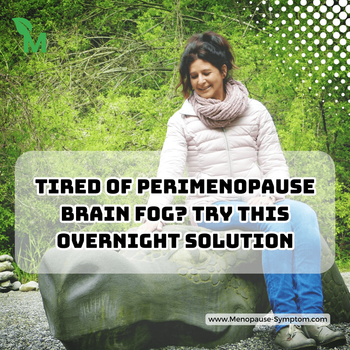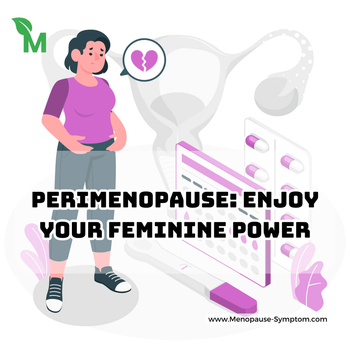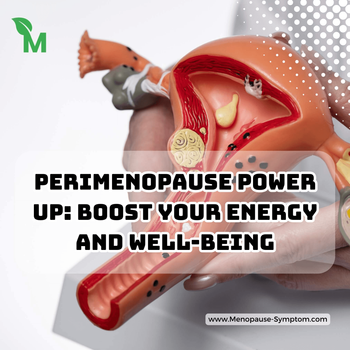Boosting Brain Power - Mental Health During Perimenopause
On
07/10/2024Reading time:
8 min
Summary:
Perimenopause is an important stage in a woman's life. During this stage, a woman's body begins to experience significant changes, not only physically but also psychologically and cognitively.
Hormonal changes caused by perimenopause can affect mental and brain health. However, this is also a great time to enhance brain power and improve mental health.
Perimenopause and its Effects on Mental Health:
Perimenopause usually occurs between the ages of 40 and 55. During this stage, women often experience symptoms such as hot flashes, insomnia, anxiety and memory loss. The hormone system, especially estrogen, gradually decreases, causing unwanted effects on the brain. Research shows that estrogen plays an important role in protecting mental health. A deficiency of this hormone can lead to difficulty concentrating, remembering, and processing information.
6 common symptoms during this stage:
· Menstrual disorders: Menstruation may become irregular, and may come earlier or later than usual. Some women may experience shorter or longer cycles, or the amount of menstrual blood may change.
· Hot flashes: Many women experience hot flashes, often at night (called night sweats). This is one of the most common symptoms and can cause discomfort and sleeplessness.
· Mood changes: Hormonal changes can affect mood, leading to feelings of anxiety, depression, or increased irritability. Women may feel emotionally unstable during this stage.
· Low sex drive: Hormonal changes can lead to a decrease in sex drive or discomfort during sex. This may be due to vaginal dryness or psychological changes.
· Sleep problems: Many women have difficulty sleeping, possibly due to hot flashes or anxiety. Insufficient sleep can lead to fatigue and a reduced quality of life.
· Physical changes: Women may notice changes in weight, especially weight gain in the abdominal area. Additionally, the skin may become drier and hair may thin.
All of these symptoms can have a huge impact on your mental health, so knowing about them and finding the right methods for yourself is essential to protecting yourself.
Boosting Brain Power During Perimenopause:
To improve mental health during perimenopause, women can apply some simple but effective measures:
Proper Nutrition:
Nutrition plays an important role in maintaining brain health. Foods rich in omega-3s, such as salmon, chia seeds, and nuts, should be included. Foods containing antioxidants such as fruits and vegetables are also essential because they help protect brain cells from aging.
Exercise Regularly:
Exercise not only helps the body stay healthy but also improves brain power. Aerobic exercises and yoga are not only good for the heart but also promote blood circulation to the brain, thereby helping to improve memory and concentration.
Train Your Mind:
Participating in brain-stimulating activities such as reading, playing mind games, or learning a new language can help improve cognitive abilities. These activities help create new neural connections and enhance memory.
Get Enough Sleep:
Sleep is an important factor in improving brain health. During perimenopause, many women have problems sleeping. Finding relaxation techniques such as meditation, taking a warm bath, or reading before bed can help improve sleep.
Reduce Stress:
Stress can negatively impact mental health. Stress management techniques such as meditation, yoga, or simply taking time for yourself can help reduce anxiety and improve mood.
The Role of Supplements:
Several studies have shown that supplements such as omega-3s, vitamin D, and herbs such as ginseng can help improve brain health. However, before using any supplements, consult your doctor to ensure safety and effectiveness.
Social Connection:
An essential element in boosting brain power during perimenopause is maintaining positive social relationships. Socializing, chatting, and sharing with friends and family not only helps reduce feelings of loneliness but also creates opportunities for learning and intellectual growth.
Embrace Change:
Perimenopause is a natural part of life. Accepting this change, rather than fearing or stressing about it, will help you feel calmer and more likely to take positive steps to improve your mental health. This is a time to find yourself again, doing the things you love and are passionate about.
Conclusion:
Perimenopause is not a final stage, but an opportunity for women to learn, grow and develop themselves. By applying the above brain health care measures, you will not only overcome perimenopause easily but also enjoy life with the highest brain power. Remember, mental health during perimenopause is completely in your hands.
Key points:
· Perimenopause and brain health: Hormonal changes can impact cognitive function, leading to symptoms like memory loss and difficulty concentrating.
· Lifestyle factors: A healthy diet, regular exercise, adequate sleep, and stress management are crucial for brain health.
· Brain-stimulating activities: Engaging in mentally stimulating activities like reading and learning new things can enhance cognitive function.
· Supplements: Consider supplements like omega-3s and vitamin D after consulting a healthcare professional.
· Social connection: Maintaining positive social relationships can boost mental well-being.
· Positive mindset: Embracing perimenopause as a natural phase and focusing on personal growth can improve overall quality of life.
Source: Team MPS compiled, analyzed and wrote. Please dont reup without source. Many thanks.

Tired Of Perimenopause Brain Fog? Try This Overnight Solution
Invalid Date

Perimenopause: Enjoy Your Feminine Power
09.02.2024
Perimenopause is a natural stage in a woman's life, usually occurring between the ages of 40 and 55. This is a time when many changes occur in a woman's body, from health to psychology and emotions.

Perimenopause Power Up: Boost Your Energy And Well-being
09.02.2024
Perimenopause is an important transitional period in a woman's life. It lasts for a few years until menopause officially occurs.
